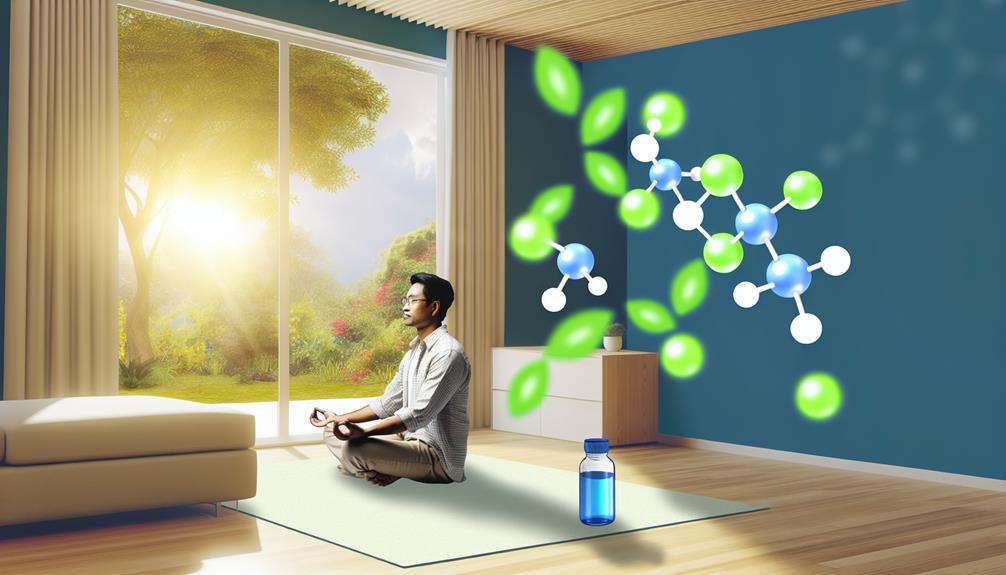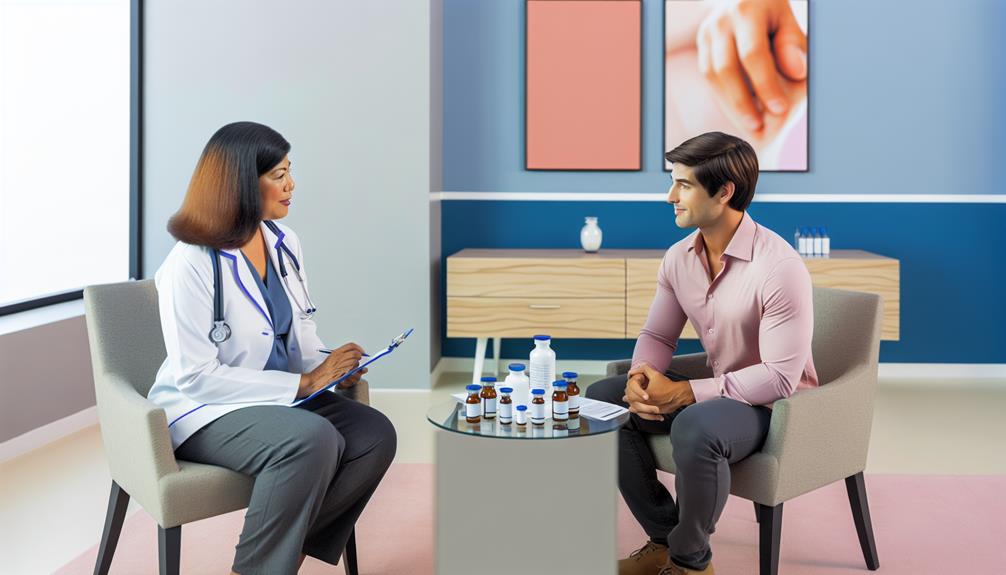I understand that hormonal changes can impact male libido, often due to fluctuations in testosterone levels. I recommend considering lifestyle modifications, like enhancing your diet with zinc-rich foods and healthy fats to support hormone production. Regular exercise, especially strength training, can boost testosterone and improve overall energy. Managing stress through mindfulness practices also helps maintain hormonal balance. If these strategies fall short, consulting a healthcare professional can provide insights into testosterone therapy or hormonal supplements. For those seeking further guidance, there are numerous resources available that can empower you in your journey toward improved sexual health.
Understanding Hormonal Changes

Hormones play a crucial role in regulating male libido, and understanding these changes is essential for anyone looking to grasp the complexities of sexual health. One of the most significant hormones involved is testosterone. I've noticed that testosterone fluctuations can greatly impact sexual desire, energy levels, and overall mood. These fluctuations can occur due to various factors, including stress, diet, exercise, and even sleep patterns. It's fascinating how the body's hormonal balance can shift dramatically in response to both internal and external stimuli.
As men age, they often experience an age-related decline in testosterone levels. This decline isn't uniform; it can vary widely among individuals. In my observations, many men begin to notice changes in libido as early as their late 30s or early 40s. These changes might manifest as a decreased interest in sex, difficulty achieving or maintaining erections, or even mood swings. Understanding that this decline is a natural part of aging can help alleviate some of the anxiety surrounding these issues.
I've learned that recognizing these hormonal changes is crucial. By paying attention to the signs of testosterone fluctuations and understanding the implications of age-related decline, we can take proactive steps to address our sexual health. This awareness is the first step toward maneuvering the complexities of libido changes and fostering a healthier relationship with our bodies as we age.
Lifestyle Modifications
Making intentional lifestyle modifications can greatly enhance male libido, especially in the context of hormonal changes. I've found that focusing on two key areas—stress management and sleep hygiene—can lead to significant improvements.
First, stress management is vital. Chronic stress can elevate cortisol levels, which may negatively impact testosterone and libido. To combat this, I've incorporated mindfulness practices, such as meditation and deep-breathing exercises, into my daily routine. Even setting aside just a few minutes each day can lower stress levels and enhance overall well-being. Engaging in physical activities, like jogging or yoga, also helps release endorphins, which can boost mood and, consequently, libido.
Next, prioritizing sleep hygiene is essential. Poor sleep quality can disrupt hormonal balance and lead to fatigue, further diminishing sexual desire. To improve my sleep, I've established a consistent bedtime routine that includes limiting screen time an hour before bed. I've also created a calming environment, ensuring my bedroom is dark, quiet, and cool. These changes have not only improved the quality of my sleep but have also made me feel more energized and interested in intimacy.
Nutritional Strategies

When it comes to enhancing male libido, nutrition plays an essential role that shouldn't be overlooked. I've found that what we consume can greatly impact our hormonal balance and overall sexual health. A well-rounded diet rich in essential nutrients can foster better testosterone levels, which are critical for libido.
In my experience, incorporating foods high in zinc, such as oysters, nuts, and seeds, can be beneficial. Zinc is essential for testosterone production, and ensuring adequate intake can help maintain healthy levels. Additionally, healthy fats found in avocados and olive oil can support hormone synthesis, making them a smart addition to any diet.
I've also explored the potential of dietary supplements and herbal remedies. For instance, supplements like fenugreek and ashwagandha have been shown in studies to positively influence testosterone levels and improve libido. These herbs not only enhance sexual desire but can also reduce stress, which is often a libido dampener. However, it's important to consult with a healthcare professional before starting any new supplements.
Moreover, a diet rich in antioxidants, such as fruits and vegetables, can improve blood flow and overall cardiovascular health, which are both essential for sexual function. As I continue to optimize my nutritional strategies, I focus on whole, unprocessed foods while being cautious with sugar and processed items that can disrupt hormonal balance. By strategically adjusting my diet, I've experienced noticeable improvements in my libido, reinforcing the notion that nutrition truly is foundational in this area.
Exercise and Physical Activity
Nutrition and exercise go hand in hand when it comes to enhancing male libido. I've found that incorporating systematic physical activity into my routine has had a noticeable impact on my hormonal balance and overall sexual health. Here are four key components of exercise that can help:
- Strength Training: Engaging in regular strength training can boost testosterone levels, which are vital for libido. Lifting weights or performing bodyweight exercises not only builds muscle but also enhances metabolic health.
- Cardio Exercises: Cardiovascular activities, like running or cycling, improve blood flow and heart health. Increased circulation can lead to better erectile function and heightened sexual performance.
- Consistency: It's essential to commit to a regular exercise schedule. Aim for at least 150 minutes of moderate-intensity exercise each week. This consistency helps maintain hormonal balance and overall fitness.
- Variety: Mixing different types of workouts can help sustain motivation and prevent plateaus. Alternate between strength training and cardio to keep your body challenged and engaged.
Medical Treatments

Medical treatments can play an essential role in addressing hormonal imbalances that affect male libido. When I consider options, two prominent approaches come to mind: testosterone therapy and hormonal supplements. Both aim to restore hormonal balance, thus potentially enhancing libido and overall well-being.
Testosterone therapy typically involves delivering testosterone through injections, patches, or gels. This treatment is particularly beneficial for men diagnosed with low testosterone levels, which can lead to diminished libido. On the other hand, hormonal supplements are often available over-the-counter and can include natural ingredients aimed at supporting testosterone production.
To better illustrate these options, I've created a table that summarizes the key aspects of testosterone therapy and hormonal supplements:
| Treatment Type | Key Features |
|---|---|
| Testosterone Therapy | Prescription required; effective for low T; various delivery methods (injections, patches, gels) |
| Hormonal Supplements | Over-the-counter; often natural ingredients; may support testosterone production but results vary |
When considering medical treatments, it's important to consult with a healthcare professional to determine the most suitable option for your specific situation. I've learned that self-medicating with hormonal supplements can sometimes lead to unintended consequences. Thus, a thoughtful approach is essential to effectively manage hormonal changes affecting libido. Always prioritize safety and efficacy when exploring these medical treatments.
Seeking Professional Support
Steering through the complexities of hormonal changes that affect libido can feel overwhelming, and that's where seeking professional support becomes vital. It's important to know that you're not alone in this journey, and there are various avenues available to help you navigate these challenges effectively.
Here are some key options to evaluate when seeking professional support:
- Therapy Options: Engaging with a therapist who specializes in sexual health can provide you with personalized strategies to cope with hormonal changes. Cognitive-behavioral therapy (CBT) and other modalities can help you address any underlying emotional or psychological issues.
- Support Groups: Joining a support group can be incredibly beneficial. Sharing experiences with others facing similar challenges can foster a sense of community and understanding, reducing feelings of isolation.
- Medical Consultation: Consulting a healthcare professional can help identify hormonal imbalances and provide tailored medical treatments, including hormone replacement therapy if necessary.
- Lifestyle Counseling: Professionals can offer guidance on lifestyle changes, such as diet and exercise, which can positively impact hormone levels and libido.
Frequently Asked Questions
Can Stress Really Impact Male Libido Levels Significantly?
Absolutely, I've noticed that stress can greatly impact male libido levels. When I'm overwhelmed, my body produces more cortisol, which can reduce testosterone and dampen sexual desire. That's why I emphasize stress management techniques in my routine. Incorporating practices like mindfulness and regular exercise not only helps with anxiety reduction but also boosts my overall well-being. By managing stress effectively, I've found my libido improves, leading to a healthier, more fulfilling life.
Are There Natural Supplements That Can Boost Testosterone?
Like a well-tuned engine, our bodies thrive on the right fuel. When it comes to boosting testosterone, I've found that certain herbal remedies, such as ashwagandha and fenugreek, can be quite effective. Additionally, making dietary adjustments—like incorporating healthy fats and zinc-rich foods—can support hormone production. It's essential to approach this holistically, combining natural supplements with lifestyle changes for best results. Always consult a healthcare professional before starting any new regimen.
How Does Sleep Quality Affect Hormonal Balance and Libido?
I've noticed that sleep quality plays a vital role in hormonal balance and libido. Sleep deprivation can lead to significant hormonal fluctuations, which often result in decreased testosterone levels. When I don't get enough rest, I feel more fatigued and my desire diminishes. It's fascinating how interconnected our sleep patterns and hormonal health are; prioritizing good sleep not only enhances my mood but also supports my overall hormonal equilibrium and sexual wellbeing.
What Age Do Men Typically Start Experiencing Hormonal Changes?
I've noticed that men typically start experiencing hormonal changes in their late 30s to early 40s. This age-related decline can lead to noticeable testosterone fluctuations, which might affect energy levels, mood, and libido. It's fascinating how these changes subtly creep in, often going unnoticed initially. By understanding this timeline, we can better prepare for the potential impacts and seek effective strategies to manage these shifts as we age.
Can Relationship Issues Contribute to Decreased Libido in Men?
Absolutely, relationship issues can greatly impact a man's libido. I've found that poor relationship communication often leads to misunderstandings, creating emotional distance. When emotional intimacy fades, it can diminish desire. In my experience, openly discussing feelings and concerns helps rebuild that connection. Without that intimacy, physical attraction may wane, and my libido can suffer. It's essential to address these issues to foster a healthier, more fulfilling relationship that supports both partners' desires.
